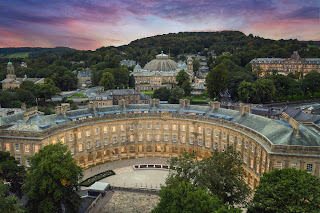Ensana, a hospitality operator focusing on medical tourism, is aiming to nearly double in size over the next three years while increasing its service offerings.
The company began life in 2019, when Hungary's Danubius Hotels Group divided its city hotels and its medical spa facilities into two separate brands. Both are under the ownership umbrella of CP Holdings Ltd, a multinational investment company based in the UK.
Given the highly-fragmented nature of Europe’s medical spas, most of which are local and independently-owned and operated, the Ensana brand quickly became the largest medical spa operator on the continent. The company now manages 27 properties in the Czech Republic, Hungary, Romania, Slovakia and the United Kingdom, many of which are located in Europe’s most historic spa towns.
For those not familiar with the concept of medical spas, they combine hotels and health facilities. Unlike the wellness hotel concept, which focuses more on relaxation and lifestyle programming (fitness classes, massages, saunas, etc.), medical spas have doctors on staff who provide treatments at on-site clinics over periods of one to four weeks.
.jpg) |
| Thermia Palace Hotel Piešťany, Slovakia |
Petra Lelovska, Ensana vice president, provides some context: “A medical spa blends hospitality and medical treatment together. Doctors provide services, while guests are treated to the hospitality services they would expect at a typical hotel. In other words, we are a hotel brand focused on health.”
Traditionally, medical spas existed to help clients suffering from specific health issues. For more than a century, ailing patients have flocked to the medical spas of Eastern and Central Europe, which harness the healing properties of natural elements to treat a range of health conditions relating to muscles, bones, organs, metabolism and skin. Still today, Frank Halmos, Ensana chief executive officer, explains, “Medical spa operators use a combination of natural resources like thermal waters and mineral-rich mud with expert medical knowledge to offer treatments supporting the health of guests.”
Ensana Gives Medical Tourism a Shot in the Arm
For decades, most guests to these hospitality/medical hybrids would book two to four-week annual stays at a facility located in-country. That way, the multi-week visit could be covered by state insurance. However, as state budgets have tightened, the insurance reimbursement process has become less reliable, and medical spas are increasingly focusing on self-paying guests to keep things going. In the past, the rate of insurance reimbursed clients (usually domestic) versus free-payers was 80-20; now that ratio has been reversed. As a result, notes Halmos, “It’s not a long-term business for Ensana to accept insurance. So, we are focusing on the free market, looking to grow international business as we acquire more upper and upper upscale properties.”
Halmos says the strategy is adding properties in countries where Ensana already operates, and then expanding to nearby countries with strong medical healing traditions, such as Austria, Germany and The Balkans (Greece and Bulgaria are high on the list). The company is also eyeing locations in further-flung places like Georgia, Kazakhstan and Egypt.
In 2020, Ensana opened the Buxton Crescent Health Spa Hotel. The historic building had languished for decades and it took 17 years to transform it.
 |
| Buxton Crescent Health Spa Hotel |
Halmos says that by the second or third quarter of 2023, he expects at least two new Ensana-branded properties to be open. By 2025, he says, the brand could have up to 45 facilities. According to Lelovska, the growth will come “mainly through hotel management contracts. We want to operate and not to buy—to be asset light and work with a portfolio of investors.”
Challenges and Changes
Ensana is also looking to grow its programming. As state insurance coverage gets phased down, the medical tourism market is facing the challenge of finding new, and in many cases, younger clients, who currently are looking more at developing healthy lifestyle practices rather than curing a particular condition. Some of these potential clients, particularly those from the North American market, may not even understand the European concept of a medical spa. Therefore, says Halmos, “The challenge for growth is increasing consumer awareness of what we offer–the proven health benefits of combining natural resources with medical knowledge.”
Due to demographic changes and the increased demand for preventive health programs, Ensana is expanding its offerings. “New health enhancement options will include lifestyle programming around issues such as weight loss, healthy eating, and de-stressing," Lelovska says.
The additions will blur some of the lines between what in North America is considered holistic wellness tourism (a term not highly esteemed in the European health spa community) and pure medical tourism. “We are looking to add more programming that allows for shorter stays, which will appeal to clients seeking more of a leisure focus for enhancing their health,” says Lelovska. The new concept will be unveiled next year at the Ensana on Margaret Island in Budapest and the Thermia Palace Spa Hotel located in Piešťany, Slovakia. After that, the plan is to offer similar “health enhancement” options at Ensana locations in Marienbad, Czech Republic and Buxton, England.
This article originally appeared in the December 9 edition of Hospitality Insights.



